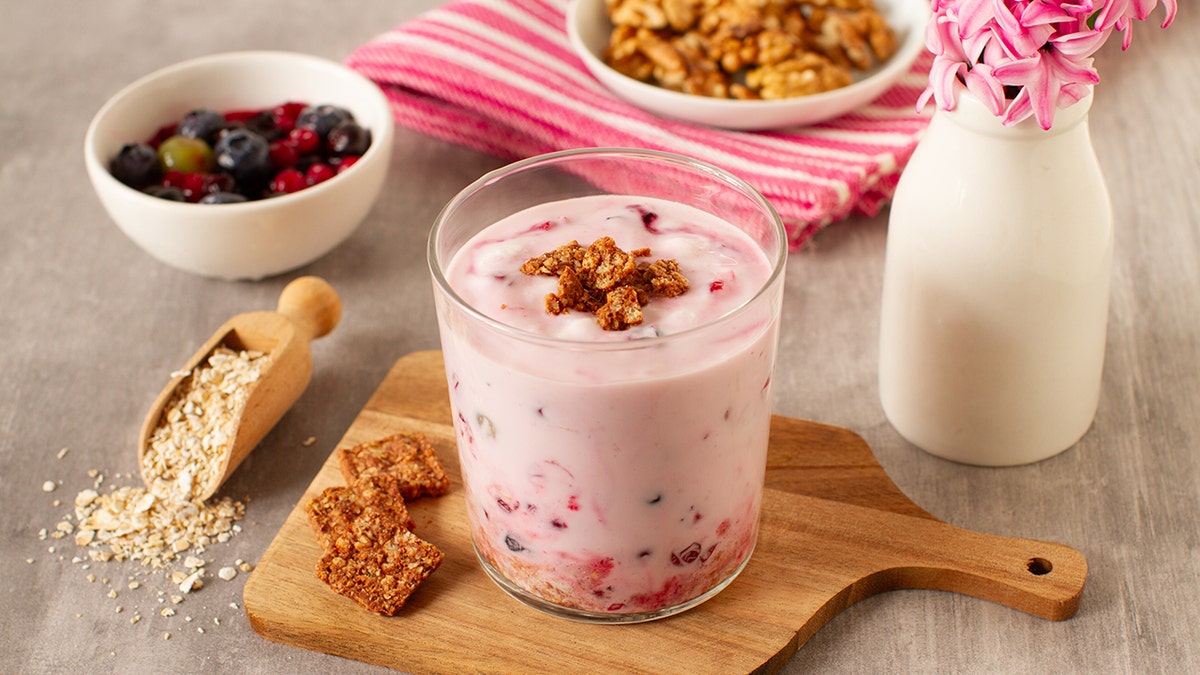New study suggests this artificial sweetener could increase hunger
Board-certified rheumatologist Dr. Mahsa Tehrani joins ‘America Reports’ to break down a new study on the connection between the artificial sweetener Splenda and hunger.
Sugar is not so sweet when it comes to aging, especially when it's about your skin, brain health and the inflammation in your body, experts told Fox News Digital.
"In essence, sugar acts like a slow poison when consumed in excess. It silently damages the structures that keep us young, our collagen, our vasculature, our metabolic systems and even our brain," Daniel Tawfik, a molecular biologist and co-founder of Healthspan, a digital medical clinic in Santa Monica, California, that focuses on anti-aging and longevity-promoting therapies, told Fox News Digital.
Americans consume more than two to three times the recommended daily allowance of sugar, according to the American Heart Association.
Added sugars are sugars or syrups put into beverages and food to enhance sweetness and texture.
They are absorbed quickly into the bloodstream, contributing to spikes in blood sugar, according to Healthline.

Excess sugar can lead to a process called glycation where the body forms harmful Advanced Glycation End-products (AGEs) which can stiffen tissues, damage blood vessels and impair the function of critical cells. (iStock)
"Our physiology simply wasn't designed to handle such a continuous influx of refined sugar, and it's straining our systems in ways that accelerate the aging process," Tawfik said.
Sugar and wrinkles
Consuming excess sugar can lead to a process called glycation, in which the body forms harmful Advanced Glycation End-products (AGEs). AGEs stiffen tissues, damage blood vessels and impair the function of critical cells, from skin cells to neurons, Tawfik said.
DIABETES RISK LINKED TO THESE ULTRAPROCESSED FOOD COMBINATIONS
AGEs can damage collagen and elastin, the proteins that keep skin firm and elastic.
AGEs can also "lead to more wrinkles, sagging and dullness in the skin," Michigan-based registered dietitian nutritionist Grace Derocha, a spokesperson for the Academy of Nutrition and Dietetics, told Fox News Digital.

Excess sugar can "lead to more wrinkles, sagging and dullness in the skin," a registered dietitian nutritionist told Fox News Digital. (iStock)
Age-related diseases
Accumulation of AGEs "is linked not only to wrinkles and skin thinning, but also to age-related diseases like diabetes, kidney disease, cardiovascular disease and even Alzheimer's," Tawfik told Fox News Digital.
Excess sugar can drive chronic inflammation and oxidative stress, two foundational processes in biological aging, Tawfik said.
HOMEMADE VS. PROCESSED FOODS: STUDY CHALLENGES WHAT WE THINK IS HEALTHIER
Over time, a constant glucose supply can also overwhelm power-generating mitochondria in the body, making them less efficient.
This mitochondrial dysfunction is considered a "signature of aging," according to Tawfik, and contributes to muscle loss, fatigue, degeneration of nerves and organ decline.

Excess sugar can drive chronic inflammation and oxidative stress, two foundational processes in biological aging. (iStock)
This chronic inflammation is often called "inflammaging," Derocha told Fox News Digital, because inflammation "contributes to age-related decline throughout the body."
Hormones and sleep
"Frequent spikes in blood sugar and insulin can also disrupt hormonal balance, affect mood and impact sleep – all of which play a role in how we age and how we feel as we age," said Derocha, who is also a certified diabetes educator.
It can also affect cortisol levels and cause fluid retention and inflammation around the midsection and face, Derocha told Fox News Digital.
SIMPLE WAYS TO INCREASE FIBER IN YOUR DIET AND WHY IT'S SO IMPORTANT
"The occasional dessert or sweet treat isn't going to age you overnight," Derocha said.
"The concern lies in chronic overconsumption of added sugars, which are often hidden in processed foods, sweetened beverages and even some 'health' products."
Tips to reduce sugar consumption
Cutting back on added sugar intake doesn't have to be "all or nothing," according to Derocha, who stressed the importance of reading labels to avoid unwanted sugars.
"The occasional dessert or sweet treat isn’t going to age you overnight. The concern lies in chronic overconsumption of added sugars."
Be mindful that added sugars may be listed under different names, such as "cane sugar, corn syrup, honey, agave [and] fruit juice concentrate," Derocha warned.
Swap packaged treats for fruit and nut butter or plain Greek yogurt and berries.

"Granola, protein bars, flavored yogurts and smoothies can have more sugar than a candy bar," an expert told Fox News Digital. (iStock)
"Granola, protein bars, flavored yogurts and smoothies can have more sugar than a candy bar," Derocha said.
For more Lifestyle articles, visit foxnews.com/lifestyle
"Always check the label, even on 'healthy' options."
Opt for sparkling water, water infused with citrus, cucumber or mint or unsweetened iced tea instead of soda, flavored coffee or sweet tea, she suggested.
CLICK HERE TO SIGN UP FOR OUR LIFESTYLE NEWSLETTER
"Sugar isn't evil – it's just overused and under-acknowledged in our food system," Derocha said.
"Learning to spot it, enjoy it mindfully and reduce excess can have huge benefits for energy, skin, mood and long-term health, especially for those managing or preventing diabetes."
CLICK HERE TO GET THE FOX NEWS APP
The American Heart Association recommends no more than 25 grams of added sugar per day for women and no more than 36 grams for men.










































